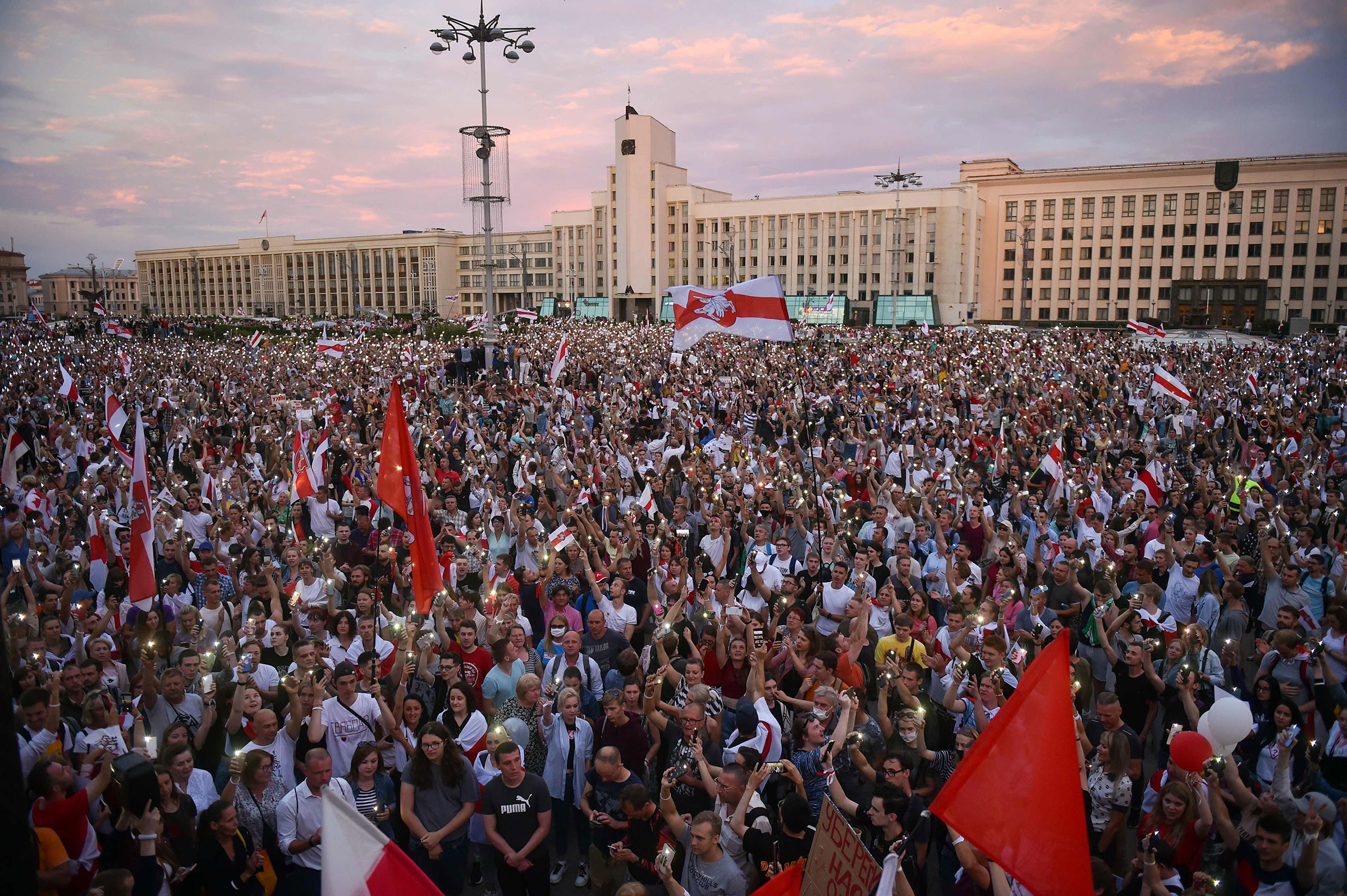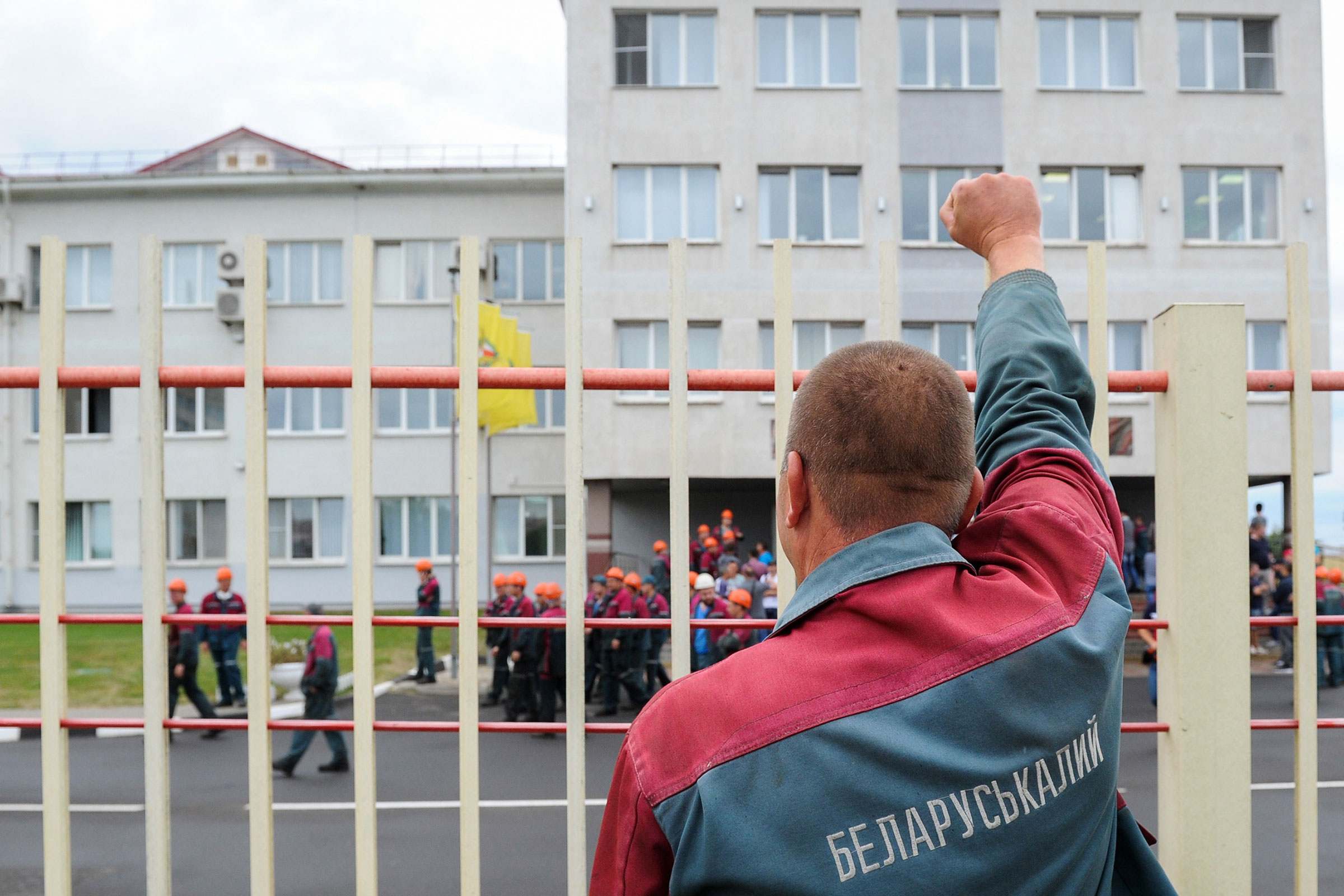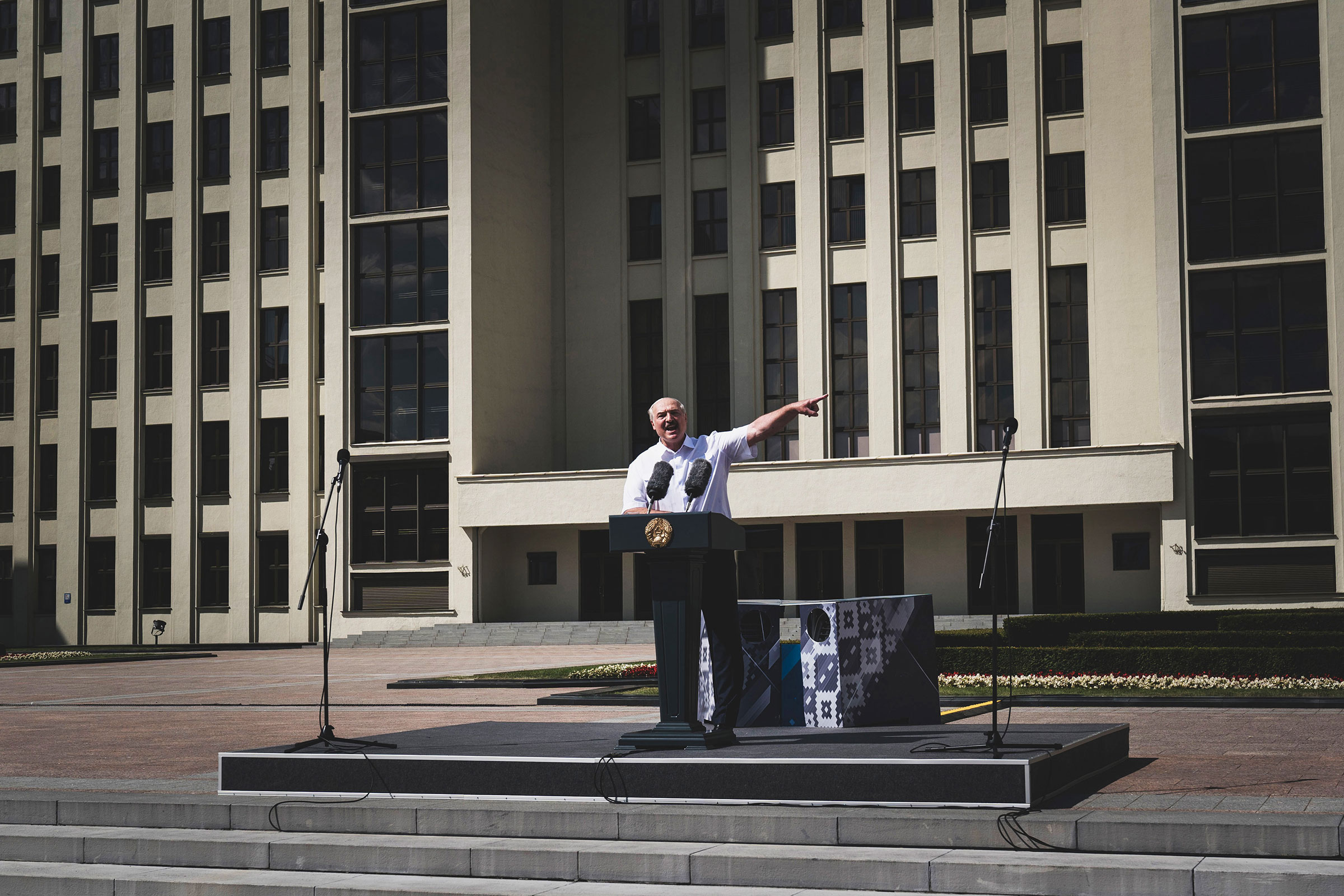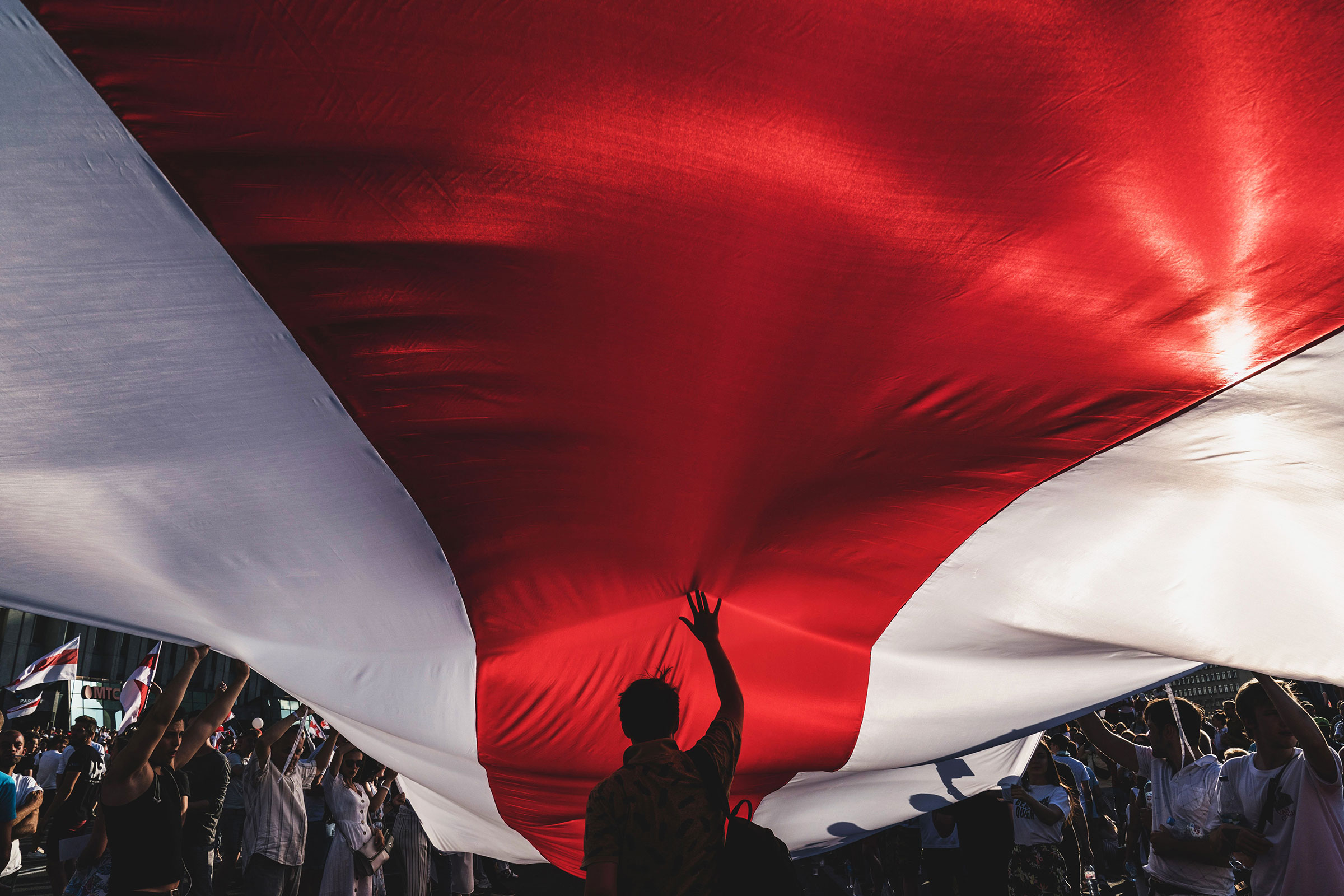
For over a week, tens of thousands of people have protested across Belarus over disputed elections on Aug. 9 after which Alexander Lukashenko, Europe’s longest serving leader, claimed a sixth term as president. Thousands of people, including factory workers, police officers and TV presenters, have gone on strike to join the protests and call for the President—who has ruled the ex-Soviet country of 9.5 million—since 1994 to step down.
“Belarus has not seen protests like this since the collapse of the Soviet Union,” says Matthew Frear, a Belarus expert at Leiden University in the Netherlands.
Clashes with riot police have left at least two dead, hundreds injured and at least 6,700 arrested. Authorities have launched a severe crackdown in the capital city, Minsk, where police have deployed stun grenades and rounds of rubber bullets and drove a van into crowds. According to Amnesty International, detained protesters have been subjected to “widespread torture.”
Fighting for his political future like never before, Lukashenko has tried to show he hasn’t lost the support of the nation—but hasn’t had much success. When Lukashenko toured the Minsk Wheel Tractor Plant on Monday and told the crowd, “you workers have always supported the president,” the workers chanted “Go away!”
Later the same day, during a visit to another factory, Lukashenko offered to change the constitution. “We’ll put the changes to a referendum, and I’ll hand over my constitutional powers. But not under pressure or because of the street,” he said. The opposition says he’s made empty promises like this before.
What happened with Belarus’ election?
On Aug. 10, official results handed Lukashenko 80.1% of the vote. His main rival, Svetlana Tikhonovskaya, a political newcomer and former teacher, only won 10.1%. She rejected the outcome, insisting that she would have won support ranging from 60% to 70% had votes been properly counted. “It’s difficult to say what the result would have been because the entire process was rigged — some of the votes cast for Lukashenko were faked,” says Frear. “But in some polling stations, where it was done more fairly, she did receive up to 80% of the votes. The only way to know is to hold new free and fair elections” he adds.
Dubbed ‘Europe’s Last Dictatorship’ by George W Bush in 2005, Lukashenko’s regime has banned opinion polls, jailed opposition figures and conducted elections that were called “severely flawed” by the European Commission. “The last free and fair elections were in 1994,” says Frear.
Three months ahead of the Aug. 9 elections, authorities jailed opposition rivals and barred them from running, including Tikhanovskaya’s husband, a popular YouTuber and opposition figure, Sergei Tikhanovsky at the end of May.
Hours after denouncing the elections, Tikhanosvkaya fled to neighboring Lithuania, where she had previously evacuated her children ahead of the elections. In a YouTube video, she said she made the “very difficult decision independently,” adding that “children are the main thing in life” and that the political unrest is not worth anyone losing their life. She has since told protesters not to “stay on the sidelines” and to rally peacefully. “We have always said that we need to defend our choice only by lawful, non violent means,” she said in another video on Aug. 14.

Why are workers protesting?
Protests have emerged across Belarus since June amid anger over the jailing of opposition figures, economic stagnation and Lukashenko’s mismanagement of the coronavirus crisis, which he dubbed a “psychosis” that could be cured by a vodka and a sauna visit despite recently contracting the illness himself. Since the election results, more than a dozen protests have emerged in towns and cities over the disputed election results. Unofficial estimates for a protest in the capital on Sunday ranged between 100,00 and 220,000 people. Thousands of people rallied last night in Minsk for a ninth consecutive night since Lukashenko declared victory.
Workers have taken to the streets with a variety of demands, including stopping the police violence and holding new elections.
Videos and photos shared on social media in recent days showed workers at several state-run enterprises walking off the job and telling their bosses they would not go back to work until police stop beating up demonstrators and authorities release the thousands of protestors detained since the election. Police officers and members of the special forces (Omon) have announced they were quitting on social media. In one video, a security officer burns his uniform in a show of defiance.
Several journalists and TV presenters have also gone on strike, demanding that state media cover the protests objectively, says Katia Glod, a London-based independent expert on Belarus and former consultant at European Endowment for Democracy, a think tank in Brussels. The state media is “complete propaganda,” Glod says. “It has portrayed the protests as ‘riots.'”
At least six presenters have left the state-run broadcasting company, Belarus-1 (BT) channel, in the past week, including Andrei Makayonak, a host on the Good Morning Belarus program, who resigned on Aug. 12. In an interview with daily newspaper Komsomolskaya Pravda in Belarus, he said: “Before I always remained neutral, because I was sure that when the situation is not very good, there must be a positive person who supports everyone with his smile.” He said that in the country’s current climate, his smile feels “rather blasphemous” and no longer “inspires the audience.”

How has Lukashenko responded to the protests?
On Aug. 14—the sixth consecutive day of protests—Lukashenko called the demonstrators foreign-backed revolutionaries who are trying to destabilize the country. “Don’t throw yourselves onto the streets. You must understand that you are being used, and our children are being used, like cannon fodder,” he said in a televised address.
Since the elections, people in Belarus report intermittently losing access to the Internet, social networks and messaging apps, triggering suspicions among protesters that the government is using technology as a means of stifling dissent. Lukashenko, however, has denied that the government is involved and claimed the Internet was being disconnected from abroad. “In the past, the authorities have blocked the sites of opposition candidates. But a full Internet shutdown has never happened before,” Frear says.
In the context of a deep recession and the coronavirus crisis, Lukashenko will need to borrow a lot of money from foreign governments, says Glod. “His loss of legitimacy threatens his ability to get money from Western institutions and that’s what bothers him,” she adds.
Belarus has long relied on Russian energy subsidies worth billions of dollars each year shore up its largely state-controlled economy. But over the past year, the Kremlin has ramped up pressure on Belarus to accept closer political and economic ties by increasing energy prices and cutting subsidies. But Lukashenko has rejected several of Moscow’s proposals over the years for deeper integration, including a single currency.
Under siege from the West, Lukashenko appears to be turning to his Russian neighbor for support. After a phone conversation with Vladmir Putin, Lukashenko declared on Aug. 15 that Putin had agreed to provide “comprehensive security assistance” against the protests. Lukashenko didn’t specify details but he said that “when it comes to the military component, we have an agreement with [Russia],” referring to a treaty the countries signed back in 1999 that was supposed to create a “unified state.” The treaty was never fully implemented and in recent years, the countries’ relations have worsened as Lukashenko has pushed against Moscow’s calls for deeper economic and political ties.
Lukashenko wants Putin to bolster his number of riot police, Glod says. “He is particularly worried about a lack of police,” she says. But there’s no guarantee will Russia provide such support, Frear says. “Lukashenko might be trying to scare the opposition or to corner Russia into providing support,” he says.
A Kremlin statement on 15 Aug. made no mention of providing security assistance but expressed confidence that all the problems will be resolved soon.
How have other world leaders responded?
The elections and police brutality have drawn widespread condemnation abroad. President Trump said on Aug. 18: “it doesn’t seem like it’s too much democracy there in Belarus” and that he would like to talk to Russia “at an appropriate time” in the wake of the unrest. Secretary of State Mike Pompeo said on Aug. 10 the vote was “not free and fair” and denounced “ongoing violence against protesters and the detention of opposition supporters,” while the U.K. announced on Aug. 17, that it did not accept” the “fraudulent” Belarus presidential vote.
After Aug.14 emergency talks, the European Union announced it would impose sanctions targeting Belarusian officials responsible for the brutal crackdown and election fraud. “What happened in Belarus in the last few days is completely unacceptable and calls for a clear reaction of the E.U.,” Germany’s Haiko Maas said during a press conference the same day.
The E.U. first placed sanctions on Belarus in 2004, and tightened them in 2011 over human rights abuses and election fraud. Many sanctions, including those targeting arms companies and travel bans were lifted in 2016 after the E.U. cited progress in improving the rule of law.
The latest sanctions are unlikely to bother Lukashenko, analysts say. “They’re limited and targeted. They won’t bring the country down,” says Frear.
“The E.U. is in a difficult position. It has to stand by its values so it cannot just ignore the fraud and post election violence” Glod says. “But they don’t want to push Lukashenko towards Russia.”

What could happen next?
It looks like neither Lukashenko nor the protesters intend on backing down, analysts say. “He is a person who never compromises. He sees it as a weakness,” Glod says.
At the same time, experts doubt he can rely on Russian intervention to repress the protests. The Kremlin’s priority is to keep Belarusians on its side says Frear, but “if it openly intervenes on behalf of Lukashenko and embroils itself in a violent crackdown, it could lose the support of Belarusians.”
It would also be very costly for Putin. “He would need enormous financial resources to sustain Belarus’s collapsing economy. It’s also unclear how that could play out domestically,” says Glod. Putin’s popularity has suffered a historic blow in recent months following the economic fallout from the COVID-19 crisis, with ratings dropping to 60% in July.
The future will either see “an even more bloody crackdown or long war of attrition where neither side—the authorities or protesters—stands down,” says Frear, drawing parallels with the ongoing protests in Hong Kong.
Protesters are hoping for another election. And if a crackdown continues to fail and mass protests continue to rage, “there’s more chance Lukashenko will cede” to those calls, Frear says.
More Must-Reads from TIME
- Why Trump’s Message Worked on Latino Men
- What Trump’s Win Could Mean for Housing
- The 100 Must-Read Books of 2024
- Sleep Doctors Share the 1 Tip That’s Changed Their Lives
- Column: Let’s Bring Back Romance
- What It’s Like to Have Long COVID As a Kid
- FX’s Say Nothing Is the Must-Watch Political Thriller of 2024
- Merle Bombardieri Is Helping People Make the Baby Decision
Contact us at letters@time.com